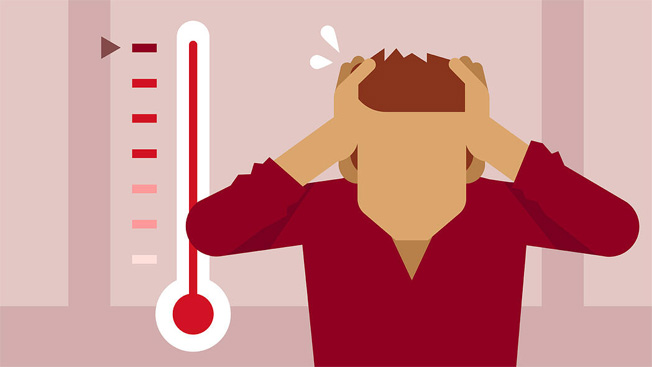Anger: The Internal Enemy

“This person really upsets me!” is a very common expression; the anger emotion arises when something or someone gets us off balance. This change from our “not angry” or relaxed state to an “angry” state, is almost unnoticeable. Of course, we know when we are angry or very angry, but when we are aware, we are already beyond the transition point from relaxed to angry. The anger energy is so strong that when it happens, we don’t realize it,. It is like a shock in which we gain awareness once we are well into the anger and in the strongest cases not even in that moment but after it goes away.
The causes for anger could be that somebody did not follow our instructions, did or said something that bothers us, did not comply with a promise, or simply did not perform well.
When anger arises, there is a chain of events: the event itself, our perception of it, what we think about it and finally the anger feeling. But these events happen so fast that we only perceive something that we dislike and then our emotion could go from a light upsetting all the way to an explosive energy that makes us yell, turn red and even physically attack a person with strong gestures.
How strong this is and to what degree it takes control over us that is not rare to hear somebody refer to his last anger attack with phrases like: “I was not myself…”, “I could not recognize myself…” or “I was out of me…”
Let’s ask first, does anger make me happy? And though the obvious answer is no, we have to analyze it because if we keep getting angry, we are getting some pleasure even if it is temporal. Sometimes anger arises from a fear emotion and gives us a feeling of power that allows us to overcome the fear.
Perhaps anger gives us the pleasure of power, of being in control of people, because the one angrier and yelling more in a specific situation could feel that is the one subjugating the other and therefore more powerful. But we have to admit that anger gives us various upsetting states that make it impossible to coexist with true happiness.
At the bottom of the event there is a strong communication need, if something did not go as we would have liked is because we were not clear enough, somebody ignored our desires and expectations and therefore with the anger we have the illusion to establish a much more clear communication. At the end of a good fight we say: “I called them out”, “I put them in their place”, and other expressions that confirm that anger allowed us to give a firmer message.
During anger, ironically communications deteriorates pretty badly, a person caught by anger can get so upset that their phrases and yelling are completely disarticulated and does not achieve to express themself well, and ends transforming the event in a total communication failure, the receptor gets scared, shuts down and basically is NOT listening because the mind is focused on one or various of the following options: to think about the arguments to defend themself and counterattack, to think how they can fix the situation, or simply to observe the big show the other part is performing in front of them. In none of these cases is the angry person a good listener.
A need of communication implies a need of closeness. Curiously our anger, causes exactly the opposite to what we want: distance.
How can we detect the anger, reduce its effects and work little by little to get rid of this emotion that is clearly not achieving our goals?
The first is to understand the sequence of events that creates the anger: the feeling of anger comes from a thought, and this thought comes from a perception we have about a person; when we notice that this feeling starts to arise, make it a habit to stop and ask yourself, what am I thinking that causes this emotion?, what am I perceiving as negative for me, that erupted this thought in me? What was the attack, frustration or disappointment? Am I going to correct something about it with this anger and all its related behaviors? Or am I going in the opposite direction of my goal to communicate more clearly why this is not good for me.
When we notice our anger, is useful to think what do I want to communicate? This helps us to relax or to look for a better moment to do it. We can also imagine that we are a movie star constantly under the eye of a camera because we cannot get rid of the paparazzi and think: how am I going to feel later when I see a filmed video of my anger attack? In it we will have of course our face altered, red face, our hands will be in the air creating all types of gestures and our yelling will be completely intimidating. Is this video clip going to be a source of pride? Will we feel good when watching those scenes?, or will it be something embarrassing and terrifying in which we will confirm the phrase “I do not recognize myself, I was not myself in that moment…”
This phrase only confirms that the angry energy has such a power that it totally takes over our control, our essential being is removed and we are no longer owners of ourselves, we do and say things that we would not want to do or say.
Anger is the internal enemy. The real enemies are not the persons or situations that are annoying or that we consider are not fulfilling our expectations, these persons are not intrinsically negatives, proof of that is the fact that in some other moment or circumstances they could have been nice or neutral to us.
The root of the what is bothering us and the frustration and therefore the root of the anger is what we think about it, the enemy is not out, it is the thought inside our mind that creates the emotion.
So next time that angers arise or you get close to it, take a deep breath and ask yourself: Will my reaction allow me to communicate better what I want to this person? Does it gets me close to them? Does it contribute to improve the situation? Will my personal video clip show a patient and in control person or a livid, fuming one?
Maybe if you practice, you will be surprised with the results.

Comments are closed.